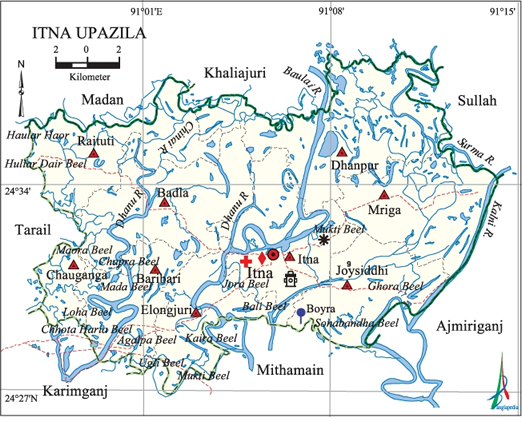Itna Upazila: Difference between revisions
No edit summary |
No edit summary |
||
| Line 54: | Line 54: | ||
''Source'' Bangladesh Population Census 2001, Bangladesh Bureau of Statistics. | ''Source'' Bangladesh Population Census 2001, Bangladesh Bureau of Statistics. | ||
[[Image:ItnaUpazila.jpg|thumb|right| | [[Image:ItnaUpazila.jpg|thumb|right|600px]] | ||
''Archaeological heritage and relics'' Badshahi Mosque and Dighi (Itna Barahati) | ''Archaeological heritage and relics'' Badshahi Mosque and Dighi (Itna Barahati) | ||
Revision as of 02:37, 7 August 2021
Itna Upazila (kishoreganj district) area 503.40 sq km, located in between 24°27' and 24°39' north latitudes and in between 90°57' and 91°57' east longitudes. It is bounded by madan and khaliajuri upazilas on the north, mithamain and karimganj upazilas on the south, ajmiriganj and sulla upazilas on the east, tarail upazila on the west.
Population Total 151157; male 79646, female 71508; Muslim 126690, Hindu 24306, Buddhist 19 and others 142.
Water bodies Main rivers: surma, Dhanu, Baulai, Kalni; Haular Haor, Maora Beel, Chapra Beel, Kaira Beel, Ugli Beel, Sonabandha Beel, Ghora Beel and Agalpa Beel are notable.
Administration Itna Thana was formed in 1917 and it was turned into an upazila in 1983.
| Upazila | ||||||||
| Municipality | Union | Mouza | Village | Population | Density (per sq km) | Literacy rate (%) | ||
| Urban | Rural | Urban | Rural | |||||
| - | 9 | 93 | 128 | 20635 | 130522 | 300 | 26.1 | 24.6 |
| Upazila Town | ||||||||
| Area (sq km) | Mouza | Population | Density (per sq km) | Literacy rate (%) | ||||
| 37.72 | 5 | 20635 | 547 | 26.1 | ||||
| Union | ||||||||
| Name of union and GO code | Area (acre) | Population | Literacy rate (%) | |||||
| Male | Female | |||||||
| Itna 51 | 12411 | 12011 | 10877 | 22.91 | ||||
| Elongjuri 8 | 7631 | 6268 | 5836 | 25.24 | ||||
| Chauganga 27 | 11964 | 5810 | 5038 | 26.55 | ||||
| Joysiddhi 60 | 9419 | 7946 | 7544 | 25.31 | ||||
| Dhanpur 43 | 16850 | 6687 | 5625 | 33.21 | ||||
| Badla 17 | 14252 | 7984 | 6650 | 23.53 | ||||
| Baribari 25 | 11199 | 12555 | 11179 | 21.29 | ||||
| Mriga 86 | 11901 | 9554 | 8888 | 24.44 | ||||
| Raituti 94 | 10429 | 10834 | 9871 | 25.48 | ||||
Source Bangladesh Population Census 2001, Bangladesh Bureau of Statistics.

Archaeological heritage and relics Badshahi Mosque and Dighi (Itna Barahati)
History of the War of Liberation During the war of liberation the Pakistan army killed a number of people at Boira of Joysiddhi union.
Marks of the War of Liberation Mass grave at Boira village of Joysiddhi union.
Religious institutions Mosque 250, temple 7, tomb 6, akhra 4.
Literacy rate and educational institutions Average literacy 24.8%; male 28.1%, female 21.2%. Educational institutions: college 1, secondary school 11, primary school 93, kindergarten 3, madrasa 21, maktab 137. Noted educational institutions: Itna College (1998), Mahesh Chandra Shikkaya Nikentan High School (1943), Thaneshwar High School (1947), Joysiddhi High School (1974), Itna Pilot Girls' High School (1984), Chauganga Fazil Madrasa (1962).
Cultural organisations Officers' club 1, women's organisation 1, community centre 1, cultural groups 5.
Main sources of income Agriculture 77.84%, non-agricultural labourer 3.45%, industry 0.32%, commerce 6.40%, transport and communication 0.37%, service 1.93%, construction 0.41%, religious service 0.30%, rent and remittance 0.16% and others 4.86%.
Ownership of agricultural land Landowner 53.91%, landless 46.09%; agricultural landowner: urban 39.22% and rural 56.17%.
Main crops Paddy, potato, mustard, peanut, vegetables.
Extinct or nearly extinct crops Kaun, china.
Main fruits Mango, black berry, banana.
Fisheries, dairies and poultries Fishery 215, poultry 81, hatchery 12.
Communication facilities Pucca road 8 km, mud road 74 km; waterway 9.18 nautical miles.
Extinct or nearly extinct traditional transport Palanquin.
Hats, bazars and fairs Hats and bazars are 12, fairs 3, most noted of which are Natun Bazar, Puran Bazar, Dhanpur Bazar, Joysiddhi Bazar, Elongjuri Bazar and Barshikura Bazar.
Main exports Paddy, fish, potato, peanut.
Access to electricity All the unions of the upazila are under rural electrification net-work. However 9.27% of the dwelling households have access to electricity.
Sources of drinking water Tube-well 88.23%, tap 0.44%, pond 4.12% and others 7.21%.
Sanitation 10.34% (urban 16.19% and rural 9.44%) of dwelling households of the upazila use sanitary latrines and 79.55% (urban 76.63% and rural 80%) of dwelling households use non-sanitary latrines 10.11% of households do not have latrine facilities.
Health centres Upazila health centre 1, family welfare centre 4, hospital 1.
Natural Disasters Many people were victims of the famine of 1943. Besides, the floods of 1974, 1988 and 1998 caused heavy damages to settlements, livestock and other properties of the upazila.
NGO activities brac, RDP, UP. [Saurav Jahangir]
References Bangladesh Population Census 2001, Bangladesh Bureau of Statistics; Cultural survey report of Itna Upazila 2007.
